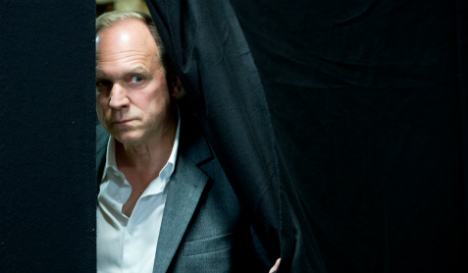Unlike many an American cop show, "Tatort" (Crime Scene) does not go in for story lines packed with blood and gore, unfeasible high-speed chases or one central, sexy but tortured character.
Nor, unusually, has the weekly 90-minute show updated its opening sequence — a dated blue and white target set to a haltering theme tune — since its November 1970 launch.
But its success in Germany is unrivalled; its formulaic approach beloved.
"It's a great Sunday evening activity," enthuses 22-year-old Jan Bültermann, taking a chair upfront at Volksbar, one of dozens of spots in Berlin where fans congregate on Sundays at 8:15 pm to watch what many consider a cult show.
As a child he had little choice but to fall in with his family's tradition of watching the series on its only television set. Nowadays, the apprentice watches it out of his own free will.
Marita Gelbe-Kruse, 55, who has taken time out from visiting Berlin to watch the 887th episode of "Tatort" at the bar with her 25-year-old son, Simon, agrees that it's a ritual that brings family together.
"It's a mother-son point in common, a thing we can do together," she told AFP.
Produced by Germany's public ARD TV channel and its regional branches, "Tatort" alternately portrays about 20 police chiefs or their teams from different German cities, as well as from German-speaking Switzerland and Austria, in their hunt for the perpetrators of a crime.
With cities such as Munich, Bremen, Leipzig or Stuttgart taking it in turns to set the stage and even regional accents playing a role, the show holds back on violence, doesn't much ponder on the private lives of its hero investigators and aims for realism.
"The series is forged on Germany's federalism," Stefan Scherer, literature professor at the Karlsruhe Institute of Technology said.
While some of the show's police inspectors have been catapulted into cultural icons, such as Horst Schimanski, played by actor Goetz George, Scherer said the principle behind "Tatort" was the ability to replace ageing police inspectors and switch cities.
"One can always create new episodes," he said.
The "Tatort" phenomenon has also been the subject of a study.
Political monthly magazine Cicero last year quoted Dennis Graef from Passau University in southern Germany, who published a study on "Tatort", as describing it as a "secular mass".
Certainly as the opening credits begin to roll in the Volksbar the hush that descends has a veil of religiosity — beer is relegated to second-fiddle, banter fades and all eyes turn to the mysterious on-screen death, which this week is set on the windswept shores of a North Sea island.
If the scenery and characters change each week, the format remains tried and tested — an opening scene, the discovery of a body, investigators arrive, the obvious suspect turns out not to be guilty and a last-minute arrest.
Next morning comes the verdict. Some 10.7 million viewers, or around one in eight Germans, watched the November 24 episode.
Audiences of "Tatort"and its former East German equivalent "Polizeiruf 110", which still sometimes takes a turn in the same time slot, can reach up to 12 million when Til Schweiger — an actor known to international audiences from Quentin Tarantino's "Inglorious Basterds" — assumes his police inspector's role in the northern port city of Hamburg.
For Berliner Andreas Klaffke, 54, the show is more than just a routine. "It's a bit like a mirror of Germany, a mirror of society and that speaks to people," he commented.
It reflects current and social affairs too, delving into issues such as the trauma of returning soldiers from Afghanistan, rising rents or secret bank accounts in Switzerland. The series rivals the weather for Monday morning small talk at the office coffee machine.
But, while German crime drama "Derrick" has been broadcast in several other countries, "Tatort" has made fewer inroads abroad.
"It must be very German somehow," Bültermann said.



 Please whitelist us to continue reading.
Please whitelist us to continue reading.
Member comments